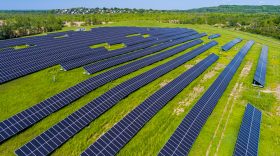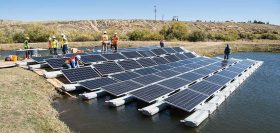The PACE financing program for solar installations – standing for Property Assessed Clean Energy – has recently experienced a revival in the Bay Area.
The program makes solar financing easy by allowing residential homeowners to borrow the upfront costs of installing solar panels, and then to repay the loan as a line item on their property tax bills over a 20-year period. Because it is considered a special tax assessment, it remains with the property if the house is sold. And PACE can help with the California drought as well, since the program now also covers water-saving home renovations, such as systems to collect “gray water” from sinks and showers.
 In California, the first commercial and residential PACE programs were inaugurated in 2008, and were first established in Berkeley about five years ago. However, it was at about that time that the Federal Housing Finance Agency (FHFA), which regulates Fannie Mae and Freddie Mac, began to oppose PACE. PACE loans are essentially attached as liens on properties. This means that, in event of foreclosure, PACE loans would have to be paid off first, which might become a major problem for the Federal government if many PACE program homes with government-sponsored mortgages went into foreclosure. So in 2010, Fannie Mae and Freddie Mac announced that they would cease purchasing mortgage loans secured by properties with outstanding PACE loans.
In California, the first commercial and residential PACE programs were inaugurated in 2008, and were first established in Berkeley about five years ago. However, it was at about that time that the Federal Housing Finance Agency (FHFA), which regulates Fannie Mae and Freddie Mac, began to oppose PACE. PACE loans are essentially attached as liens on properties. This means that, in event of foreclosure, PACE loans would have to be paid off first, which might become a major problem for the Federal government if many PACE program homes with government-sponsored mortgages went into foreclosure. So in 2010, Fannie Mae and Freddie Mac announced that they would cease purchasing mortgage loans secured by properties with outstanding PACE loans.
To remedy the situation, in 2013 Gov. Brown signed into law Senate Bill 96, which established the PACE Loss Reserve Program to mitigate the risk to mortgage lenders from PACE financing. The program created a $10 million fund, designed to cover any of Fannie Mae’s or Freddie Mac’s losses attributable to PACE liens. However, a spokesperson for the FHFA was recently quoted as saying, “We have not changed our policy at all” towards PACE.
Despite concerns that the FHFA might redline entire cities or towns participating in the PACE program, however, this has not occurred, and the agency does not appear to object to PACE in cases where other lenders are willing to bear the risk of mortgages for homeowners who participate in the program. In December, San Francisco became the first large city in California to return to residential PACE financing since the program was halted. The Executive Director of PACENow, David Gabrielson, says: “State and local government sponsored PACE programs are driving economic activity, creating local jobs, and helping achieve carbon reduction and other environmental goals.”




